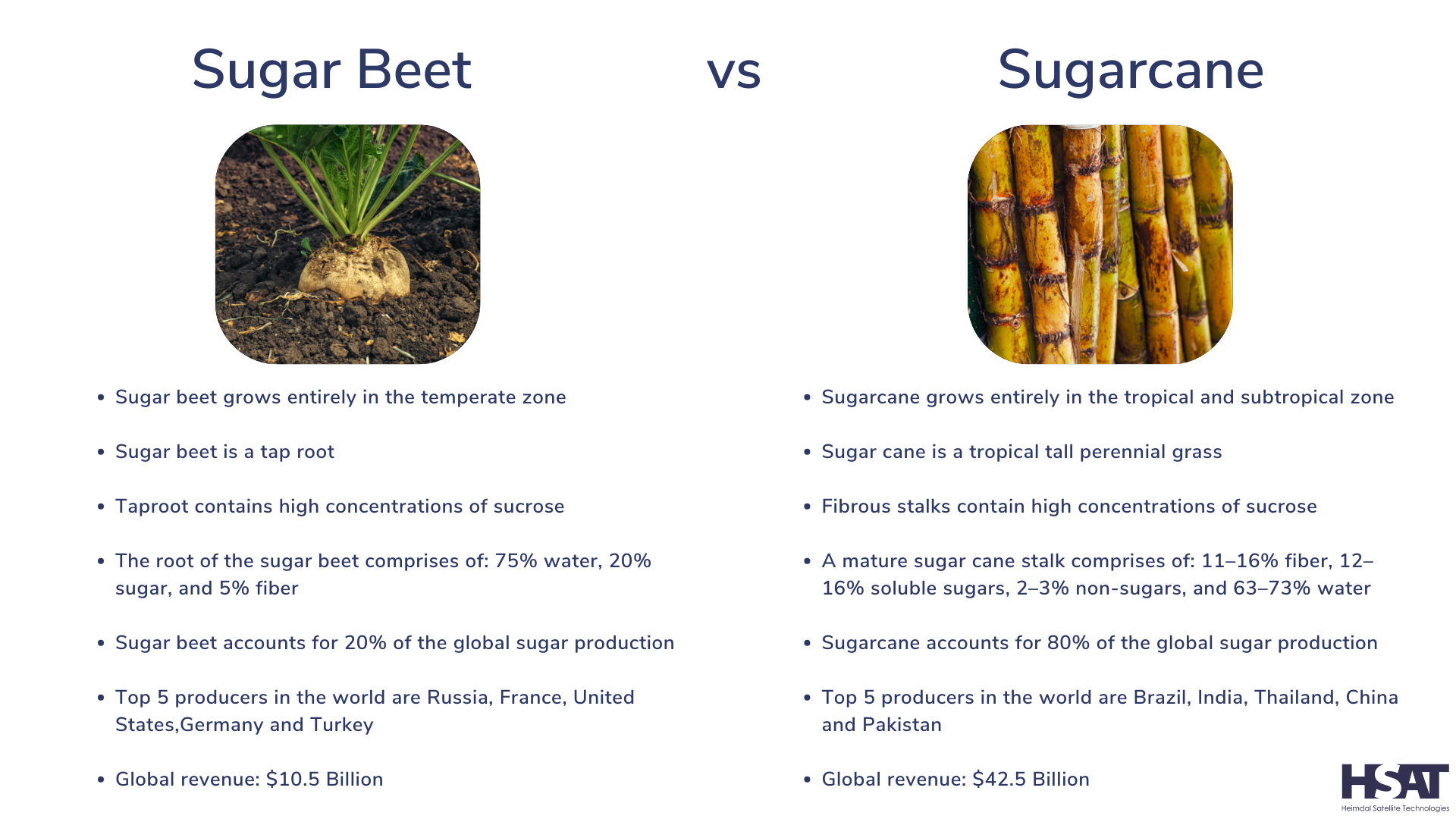Beet Sugar vs Cane: What’s the Difference in Production and Refining?
Beet Sugar vs Cane: What’s the Difference in Production and Refining?
Blog Article
The Fantastic Debate: Beetroot Sugar Vs Walking Cane and Their Influence On Health And Wellness
The ongoing argument surrounding beet sugar and cane sugar increases essential concerns regarding their particular health and wellness impacts and more comprehensive ramifications for customer options. While both sweeteners share a comparable chemical make-up, their origins and handling techniques might affect not only nourishment yet additionally environmental sustainability. As health-conscious people evaluate the benefits of each choice, the ramifications of pesticide direct exposure and agricultural practices enter into emphasis. This discussion invites us to think about not simply the sweetness we pick, yet the far-ranging impacts of those choices on our health and wellness and the world. What might this imply for future intake patterns?
Introduction of Sugar Resources
Sugar, a commonly consumed sweetener, largely stems from two main sources: sugar beets and sugar cane. These crops are cultivated in various areas around the globe, each adding to the global sugar supply in unique ways. Sugar walking stick flourishes in subtropical and exotic climates, with major producers consisting of Brazil, India, and China. The plant is gathered for its stalks, which are after that refined to remove juice and take shape sugar.
On the other hand, sugar beetroots are mostly expanded in pleasant areas, with considerable manufacturing in nations such as the USA, France, and Germany. The beetroots are gathered from the ground, sliced, and based on a procedure that transforms the drawn out juice into granulated sugar. While both sugar sources eventually produce sucrose, their farming methods, processing methods, and geographical distributions vary substantially.
These differences can influence not only the ecological impact of sugar manufacturing but additionally the economic elements of sugar pricing and profession. Comprehending the origins of these sweeteners is critical for consumers and policymakers alike, as it lays the foundation for educated discussions concerning their health and wellness ramifications and sustainability.
Nutritional Contrast
When analyzing the dietary profiles of beetroot sugar and walking cane sugar, both resources share a similar make-up as they mainly include sucrose. Sucrose is a disaccharide, composed of glucose and fructose, and is accountable for the sweet taste associated with both sugars. The refining procedures for both beet and cane sugar return items that are mainly pure sucrose, with marginal traces of vitamins, minerals, or various other nutrients.
In terms of calorie web content, both beet and cane sugars offer around 4 calories per gram. Neither sort of sugar uses considerable nutritional benefits past energy arrangement, as they do not have essential vitamins or minerals. Nonetheless, the visibility of trace elements, such as calcium, potassium, and magnesium, can differ somewhat in between both, mostly as a result of the farming techniques and soil conditions in which they are expanded.
Furthermore, the glycemic index values of beet sugar and walking stick sugar are equivalent, suggesting comparable impacts on blood sugar levels. Generally, from a dietary point ofview, beetroot and cane sugars are functionally equivalent, contributing largely to calorie consumption without supplying considerable health and wellness benefits over each other.
Health And Wellness Implications
The health and wellness ramifications of consuming beet sugar and walking cane sugar warrant mindful factor to consider, specifically provided the increasing occurrence of sugar-related health issues. Both sorts of sugar add comparable caloric values and can cause boosted dangers of weight problems, type 2 diabetes, and cardio conditions when consumed over. The body sugars both metabolizes right into sugar, which can trigger spikes in blood sugar level degrees, bring about insulin resistance with time.
While there is ongoing argument relating to the glycemic index of these sugars, researches suggest that both can negatively influence metabolic health if consumed in huge amounts. beet sugar vs cane. Additionally, the potential visibility of contaminants in beet sugar, such as pesticides from traditional farming methods, increases more health problems. Conversely, cane sugar, especially when minimally refined, might provide a slightly a lot more positive profile because of its all-natural state
Additionally, the intake of sugarcoated, no matter the resource, is connected to adverse wellness end results, including oral concerns and fatty liver condition. Consequently, moderation is visit this site right here critical, and individuals need to bear in mind their total sugar intake from all resources, inevitably focusing on entire foods over sugarcoated for optimal wellness outcomes.
Environmental Impact
Recognizing the health implications of beet and walking stick sugar likewise brings about an evaluation of their ecological influence, which can substantially affect farming sustainability and ecological equilibrium. Both sugar sources have unique environmental footprints, shaped by their growing techniques and geographical demands.

In comparison, beetroot sugar is generally expanded in warm environments and commonly entails varied crop turnings. This technique can enhance dirt wellness and lower reliance on chemical inputs. However, intensive beet farming can additionally result in nutrition deficiency and parasite stress otherwise managed sustainably.
Both sugar kinds existing obstacles and chances for ecological stewardship. Advertising lasting agricultural practices and liable sourcing can mitigate their influences, ensuring that sugar production straightens with eco-friendly conservation and long-lasting food protection.
Customer Preferences
In the middle of expanding awareness of my company wellness and ecological problems, consumer preferences for sugar kinds are increasingly influenced by perceptions of health benefits, sustainability, and ethical sourcing. Beetroot sugar and cane sugar each present distinct characteristics that appeal to various consumer demographics.
Health-conscious consumers typically inspect the nutritional accounts of these sugars, looking for options viewed as less processed or more natural. Walking stick sugar, frequently considered the typical sweetener, is in some cases favored for its perceived pureness and simplicity. In contrast, beetroot sugar, which is frequently derived from genetically changed crops, encounters apprehension among those worried concerning GMOs.
Sustainability is an additional significant variable browse around this web-site influencing consumer selections. As understanding of farming methods grows, lots of customers go with items that align with eco-friendly farming techniques. Walking cane sugar production, especially when sourced from lasting farms, can appeal to eco-conscious buyers.
Honest sourcing plays a vital function too, with consumers progressively favoring products that support reasonable labor techniques. Certifications such as Fair Trade can boost the appearance of walking stick sugar in the marketplace. Ultimately, consumer choices are formed by a complex interaction of health and wellness, ecological, and moral factors to consider, driving need for both beet and cane sugars in diverse markets.
Conclusion
To conclude, the dispute in between beetroot sugar and walking cane sugar incorporates different aspects, consisting of dietary accounts, wellness effects, and environmental effects. beet sugar vs cane. While both sugars mainly include sucrose and display similar caloric material, issues concerning pesticide use in beet sugar and the eco-friendly impact of walking stick sugar monoculture warrant cautious factor to consider. As customers increasingly focus on sustainability and health, informed selections pertaining to sugar intake end up being essential in advertising overall health and ecological stewardship

Report this page